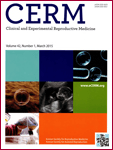
Clinical and Experimental Reproductive Medicine-CERM
Scope & Guideline
Delivering High-Quality Research for a Brighter Reproductive Future
Introduction
Aims and Scopes
- Reproductive Health Research:
CERM publishes studies related to reproductive health, including fertility, infertility treatments, and reproductive endocrinology, addressing both male and female reproductive systems. - Innovative Treatment Modalities:
The journal highlights novel therapeutic approaches and interventions in reproductive medicine, such as the use of stem cells, hormonal therapies, and nutritional supplements. - Clinical and Experimental Studies:
CERM features both clinical trials and experimental studies, bridging the gap between laboratory research and clinical applications to improve patient care. - Metabolic and Genetic Factors in Reproduction:
Research on the influence of metabolic syndromes and genetic predispositions on reproductive health is a key focus, exploring how these factors impact fertility and reproductive outcomes. - Environmental and Lifestyle Impacts:
The journal examines the effects of environmental toxins, lifestyle choices, and public health issues, such as the COVID-19 pandemic, on reproductive health.
Trending and Emerging
- Metabolomics and Biomarkers:
Research utilizing metabolomic profiling to identify biomarkers for fertility and reproductive health is on the rise, offering insights into personalized treatment strategies. - Impact of COVID-19 on Reproductive Health:
The pandemic has prompted increased studies examining the implications of COVID-19 on fertility, reproductive outcomes, and the safety of assisted reproductive technologies. - Nutritional and Supplement Interventions:
There is a growing emphasis on the role of dietary supplements and nutritional interventions in enhancing fertility and reproductive health, particularly in populations with specific deficiencies. - Artificial Intelligence in Reproductive Medicine:
The implementation of AI-driven technologies for optimizing IVF procedures and predicting patient outcomes is an emerging trend, showcasing the integration of technology in reproductive practices. - Environmental and Lifestyle Influences:
Research focusing on the effects of environmental factors, such as pollutants and lifestyle choices on reproductive health, is gaining traction, reflecting a broader awareness of public health issues.
Declining or Waning
- Traditional Pharmacological Interventions:
Research focusing on conventional pharmacological treatments for reproductive health issues, such as hormone replacement therapies, appears to be waning as newer, more innovative treatments gain attention. - Animal Model Studies:
There is a noticeable decrease in studies solely reliant on animal models, indicating a shift towards human-centered research that prioritizes clinical relevance and applicability. - Invasive Surgical Procedures:
The exploration of invasive surgical techniques for fertility treatments is declining, likely due to advances in less invasive methods and the growing preference for minimally invasive approaches.
Similar Journals

Basic and Clinical Andrology
Transforming research into practice for optimal reproductive health.Basic and Clinical Andrology, published by BMC, is a leading open access journal dedicated to the advancement of knowledge in the field of reproductive medicine and urology. Since its launch in 2013, the journal has aimed to provide a platform for the dissemination of high-quality research, bridging the gap between basic science and clinical practice. With an impressive reputation evidenced by its Q2 ranking in both reproductive medicine and urology, it serves as a vital resource for researchers, healthcare professionals, and students looking to stay updated on the latest developments in andrology. The journal actively encourages submissions across a diverse range of topics, contributing to our understanding of male reproductive health issues, advancements in treatment protocols, and innovative therapeutic approaches. Located in the United Kingdom, Basic and Clinical Andrology plays a critical role in the global discourse on andrology, offering researchers an opportunity to share their findings with a broad audience committed to improving health outcomes in these crucial fields.

Journal of the Endocrine Society
Innovating solutions through cutting-edge endocrine research.Journal of the Endocrine Society, published by the ENDOCRINE SOC, stands as a prominent platform for disseminating significant research and findings within the field of endocrinology, diabetes, and metabolism. Established as an Open Access journal since 2017, it aims to increase the visibility and accessibility of vital scholarly contributions, allowing researchers and professionals from various backgrounds to engage with the latest insights in this rapidly evolving discipline. With an impressive Q2 ranking in Endocrinology, Diabetes and Metabolism, the journal is recognized for its impact, ranking #100 out of 244 in Scopus, highlighting its role in advancing scientific knowledge and fostering innovation. The journal, based in the United States at 2055 L ST NW, SUITE 600, WASHINGTON, DC 20036, continues to enrich the academic landscape by converging state-of-the-art research and clinical applications through its publication cycle from 2017 to 2024. Researchers, students, and healthcare professionals are encouraged to explore this essential resource to stay at the forefront of endocrinological advancements.

Gynakologische Endokrinologie
Bridging Knowledge Gaps in Gynecological EndocrinologyGynakologische Endokrinologie is a pivotal journal published by SPRINGER HEIDELBERG, dedicated to advancing the fields of endocrinology, obstetrics, gynecology, reproductive medicine, and pediatrics. With an ISSN of 1610-2894, this journal serves as a valuable platform for researchers and practitioners to disseminate their findings and explore emerging trends and treatments in the realm of women's health and endocrine disorders. Though currently positioned in the Q4 quartile across relevant categories, its mission is to foster scholarly discourse that bridges gaps in knowledge and enhances clinical practices. With a commitment to quality research, it provides a forum for innovative studies and case reports that could influence future healthcare strategies. Positioned in Germany, Gynakologische Endokrinologie aims to cater to a global audience, enhancing knowledge and collaboration in critical areas impacting women's health and hormone-related conditions.
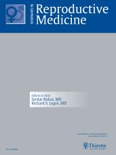
SEMINARS IN REPRODUCTIVE MEDICINE
Elevating Knowledge in Reproductive SciencesSEMINARS IN REPRODUCTIVE MEDICINE is a leading peer-reviewed journal dedicated to exploring the complexities of human reproduction, offering insightful perspectives that encompass advances in reproductive endocrinology, obstetrics, and gynecology. Published by THIEME MEDICAL PUBL INC, this esteemed journal holds a notable spot in multiple Scopus categories, ranking 21st in Reproductive Medicine and 38th in Obstetrics and Gynecology, with an impressive impact in the Q1 and Q2 quartiles. With its commitment to high-quality research and clinical implications, the journal serves as a vital resource for practitioners, researchers, and students alike, fostering an environment of innovation and collaboration in the rapidly evolving reproductive health landscape. SEMINARS IN REPRODUCTIVE MEDICINE also offers convenient open access options, ensuring that its contributions are readily available to the global academic community. For over two decades, from its establishment in 1999 to the present, it has retained a pivotal role in disseminating critical findings that inform both clinical practice and future research efforts.
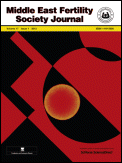
Middle East Fertility Society Journal
Exploring breakthroughs in reproductive health.Middle East Fertility Society Journal is a premier open-access publication established in 1996 that caters to the fields of Obstetrics and Gynecology as well as Reproductive Medicine. Published by SPRINGER in Egypt, this journal has made significant strides in disseminating high-quality research and advancements in reproductive health, achieving a 2023 Scopus rank of #102 in Obstetrics and Gynecology and #47 in Reproductive Medicine, placing it in the 51st and 48th percentiles respectively. With an aim to foster collaboration and innovation in the fertility sector, it welcomes researchers and practitioners to share their findings and insights, contributing to the global discourse on reproductive issues. As an open-access journal since 2010, it ensures that the latest research is readily available to a broad audience, enhancing accessibility and knowledge transfer in the vital area of reproductive health.
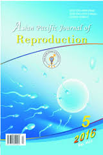
Asian Pacific Journal of Reproduction
Empowering Researchers to Shape the Future of ReproductionAsian Pacific Journal of Reproduction is a dynamic open-access journal specializing in a diverse array of topics related to reproduction across various species, including humans, animals, and plants. Published by Wolters Kluwer Medknow Publications, this peer-reviewed journal has been committed to disseminating high-quality research since its inception in 2012. With an accessible ISBN of 2305-0500 and E-ISSN 2305-0519, the journal has rapidly established itself within the academic community, evidenced by its categorization in Q3 and Q4 quartiles across multiple fields, including Obstetrics, Gynecology, and Animal Science. Researchers are encouraged to contribute their findings to foster a deeper understanding of reproductive health and practices in the Asian Pacific region and beyond. The journal's inclusive scope and emphasis on interdisciplinary collaboration make it a crucial platform for professionals and scholars seeking to stay at the forefront of reproductive research.

Reproduction and Fertility
Advancing insights in reproductive health.Reproduction and Fertility is a premier academic journal published by BIOSCIENTIFICA LTD, dedicated to advancing knowledge in the fields of reproductive sciences, obstetrics, gynecology, and related areas. Established with a focus on delivering high-quality research, this journal has quickly ascended in prominence, achieving a commendable Q2 ranking in multiple categories, including Embryology, Obstetrics and Gynecology, Reproductive Medicine, and Urology, as of 2023. With an E-ISSN of 2633-8386, Reproduction and Fertility aims to provide a valuable platform for researchers, professionals, and students alike, offering insights into the latest discoveries and innovations in reproductive health. Although currently not an open-access journal, it remains committed to disseminating important findings that can influence clinical practices and policy-making worldwide. Operating from its headquarters in Bristol, United Kingdom, the journal serves as an essential resource for anyone invested in understanding and improving reproductive health outcomes through rigorous academic research.
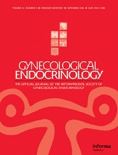
GYNECOLOGICAL ENDOCRINOLOGY
Advancing Women's Health through Endocrinological InsightsGYNECOLOGICAL ENDOCRINOLOGY is a prestigious open-access journal published by Taylor & Francis Ltd, focusing on the dynamic fields of endocrinology, obstetrics, and gynecology. With its ISSN of 0951-3590 and E-ISSN of 1473-0766, this journal provides a vital platform for the dissemination of high-quality research and advancements in gynecological endocrinology since its inception in 1987. Notably, it attained an Open Access status in 2023, enhancing its reach and accessibility to researchers and practitioners worldwide. The journal is renowned for its rigorous peer-review process and holds significant standing with a Q2 ranking in Obstetrics and Gynecology and a Q3 ranking in Endocrinology, Diabetes, and Metabolism, as of 2023. It is indexed with commendable Scopus ranks in various medical domains, offering a reliable resource for current methodologies and future directions in gynecological health. With the growing emphasis on women's health and endocrinological research, GYNECOLOGICAL ENDOCRINOLOGY serves as an essential repository for innovative studies, clinical insights, and emerging therapeutic strategies, making it an invaluable resource for researchers, clinicians, and students alike.
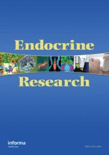
ENDOCRINE RESEARCH
Unveiling the intricacies of endocrine systems.ENDOCRINE RESEARCH is a prominent peer-reviewed journal published by TAYLOR & FRANCIS INC, focused on the dynamic field of endocrinology. With an ISSN of 0743-5800 and an E-ISSN of 1532-4206, this journal has been contributing to the scientific community since 1974, providing a platform for researchers to disseminate innovative findings related to hormonal research and its implications in diverse medical contexts. Operating from the United States, it falls within the Q3 quartile ranking in both Endocrinology and Medicine (Miscellaneous), reflecting its recognized impact within these disciplines. While ENDOCRINE RESEARCH currently does not offer open access options, it remains an invaluable resource for professionals, students, and researchers seeking to stay at the forefront of endocrine science and clinical application. The journal invites original research articles, reviews, and case studies, fostering a collaborative environment for discussing the complexities of endocrinological phenomena.

Reproductive Medicine
Exploring the Frontiers of Reproductive MedicineReproductive Medicine is an esteemed open-access journal published by MDPI, focusing on the latest research and advances in reproductive health, fertility, and assisted reproductive technologies. With its E-ISSN of 2673-3897, the journal aims to provide a platform for researchers, clinicians, and healthcare professionals to disseminate their findings, share innovative practices, and engage in scholarly discourse. Situated in Basel, Switzerland, Reproductive Medicine emphasizes a multidisciplinary approach, exploring biological, clinical, and psychological aspects of reproductive health. Although the journal is in the early stages of establishing metrics such as H-index and Scopus rankings, its open-access model enhances accessibility, allowing for a broad dissemination of knowledge. Committed to fostering advancements in the field, Reproductive Medicine is essential for those seeking to stay at the forefront of reproductive health research.